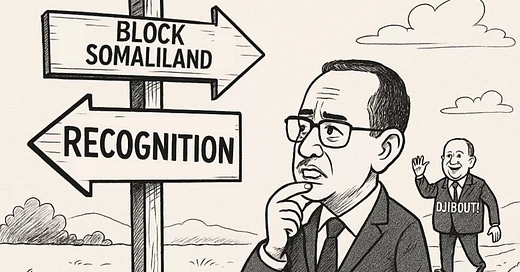Somaliland, a self-declared republic in the Horn of Africa, functions as a de facto independent state since 1991. While lacking international recognition, its growing strategic importance especially through its partnership with the United Arab Emirates (UAE) at the Port of Berbera is reshaping political dynamics in the region. Major powers are turning their attention to the Red Sea and Gulf of Aden while Somaliland is becoming more central in conversations about maritime security, trade and sovereignty.
Somaliland’s case is challenging conventional ideas of statehood and recognition in Africa. Important questions about how geopolitical value can shift perceptions and whether strategic utility can outweigh legal and institutional barriers are being raised.
Berbera Port and UAE Investment
The Port of Berbera, developed by UAE-based DP World with over $400 million in investment, is a key logistics hub in the Horn of Africa. Its modernization is positioning it as a viable alternative to Djibouti, especially for Ethiopia, which depends a lot on external access to ports.
The port currently has a 17-meter-deep draft, allowing it to accommodate large container ships and vessels over 50,000 deadweight tonnage (DWT). The new container terminal’s capacity is 500,000 TEU annually, with expansion room of 2 million TEUs. The ability to hold Panamax and post-Panamax vessels makes Berbera strategic bor both Ethiopia and broader regional logistics. The port also includes a free economic zone and improved hinterland connectivity via Berbera Corridor, linking to Ethiopia.
Beyond trade, the port also holds strategic value for naval logistics and intelligence operations. Recent interests from the United States is emphasizing its potential as a regional security asset, with rising tensions in the Red Sea.
Berbera is becoming part of a bigger geopolitical competition and no longer just a commercial facility. The UAE’s early involvement is giving it a first-mover advantage and by drawing attention from the U.S., it indicates an increasing strategic relevance in the Red Sea corridor.
Berbera, being Somaliland’s flagship maritime asset has other rival ports such as Maydh and Zeila. However, underdeveloped and lack the scale or investment Berbera is receiving. Comparatively, Berbera stands out for its modernization, international partnerships and multi-purpose functionality. Maydh is being used more for fishing and small-scale trade and Zeila, being close to Djibouti, is limiting its strategic uniqueness. This makes Berbera unrivaled when it comes to infrastructure, geopolitical leverage and scope within Somaliland’s territory.
Ethiopia’s pursuit of sea access
In early 2024, Ethiopia and Somaliland signed a memorandum of understanding (MoU) which grants Ethiopia access to a part of Somaliland’s coastline for commercial and naval use. In return, Ethiopia has pledged to consider recognizing Somaliland as a sovereign state.
This agreement is sparking strong reactions, especially from Somalia, the African Union (AU), and the Arab League who are seeing it as a violation of Somalia’s territorial integrity. The deal is also creating tension among regional actors. Thus, raising concerns around the involvement of non-state armed groups.
Ethiopia’s actions reflect a growing frustration with dependance on Djibouti hence, willingness to explore alternatives. It also shows a shift in African diplomacy, where bilateral interests may take precedence over long-held regional norms about sovereignty and borders.
Informally, many countries engage with Somaliland without formally recognizing it. The U.K, Denmark, Ethiopia, Turkey, Djibouti, Kenya and Taiwan have liaison offices in Hargeisa. The function of these offices is to serve diplomatic and trade purposes, signing to Somaliland’s growing soft power and strategic relevance. Taiwan’s engagement stands out for being mutual as Somaliland is also establishing a representative office in Taipei.
The recognition dilemma
Despite Somaliland having functional institutions, peaceful governance, and diplomatic engagements, no country is formally recognizing it, at least in a legal sense. While the MoU with Ethiopia and engagements with figures like President Trump is growing its visibility, many countries (including U.S.) are rather affirming Somalia’s unity.
Recognition may bring benefits such as access to development finance, investment, and international forums but there are risks that could encourage separatist movements in other African countries-a major concern for regional leaders and institutions.
The reluctance in acknowledging Somaliland comes from worries of setting precedent that could destabilize other parts of Africa. Yet, the longer Somaliland is operating successfully without recognition, the more it calls into question whether the current framework of African unity is accurately representing regional realities.
If Somalia happens to regain central authority with a robust military, it will be a direct threat to Somaliland’s de facto autonomy. Many global powers like China, Russia, India (traditionally emphasizing sovereignty and non-interference), will remain cautious or even oppose to formal recognition of breakaway territories. This puts Somaliland in a delicate position in which they have to navigate international diplomacy and also maintain their autonomy in a competitive and securitized maritime zone.
Given that, Somaliland’s efforts for recognition are rooted in the strategic relevance and internal governance. It is collaborating with foreign investors and neighboring states-placing it at the center of regional politics in the Horn of Africa.
The Port of Berbera is just one example of how infrastructure and geography is influencing sovereignty debates in modern geopolitics. As competition for influence around the Red Sea is growing, so will Somaliland’s role-whether formal recognition is granted or not.
This case shows that non-recognized states can use strategic assets to assert influence and shift regional dynamics. Its also highlighting the tension between legal norms and political realities which may define Africa’s diplomatic landscape in the coming years.
About the Author: Jasleen Gill is an International Relations graduate with a minor in Criminal Justice and concentration in Peace and Conflict studies, with a strong focus on security, diplomacy, and conflict resolution. Passionate about global governance, humanitarian action, geopolitics and intelligence analysis, she explores the dynamics of war, peacebuilding, and international security, with a particular interest in Africa’s evolving role in global affairs.





Informative article, Jasleen. I appreciate your insights into African geopolitics and economics.